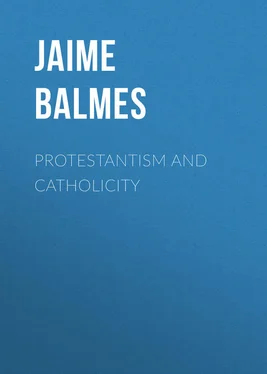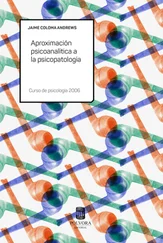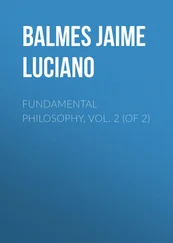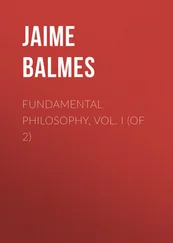Jaime Balmes - Protestantism and Catholicity
Здесь есть возможность читать онлайн «Jaime Balmes - Protestantism and Catholicity» — ознакомительный отрывок электронной книги совершенно бесплатно, а после прочтения отрывка купить полную версию. В некоторых случаях можно слушать аудио, скачать через торрент в формате fb2 и присутствует краткое содержание. Жанр: foreign_antique, foreign_prose, на английском языке. Описание произведения, (предисловие) а так же отзывы посетителей доступны на портале библиотеки ЛибКат.
- Название:Protestantism and Catholicity
- Автор:
- Жанр:
- Год:неизвестен
- ISBN:нет данных
- Рейтинг книги:3 / 5. Голосов: 1
-
Избранное:Добавить в избранное
- Отзывы:
-
Ваша оценка:
- 60
- 1
- 2
- 3
- 4
- 5
Protestantism and Catholicity: краткое содержание, описание и аннотация
Предлагаем к чтению аннотацию, описание, краткое содержание или предисловие (зависит от того, что написал сам автор книги «Protestantism and Catholicity»). Если вы не нашли необходимую информацию о книге — напишите в комментариях, мы постараемся отыскать её.
Protestantism and Catholicity — читать онлайн ознакомительный отрывок
Ниже представлен текст книги, разбитый по страницам. Система сохранения места последней прочитанной страницы, позволяет с удобством читать онлайн бесплатно книгу «Protestantism and Catholicity», без необходимости каждый раз заново искать на чём Вы остановились. Поставьте закладку, и сможете в любой момент перейти на страницу, на которой закончили чтение.
Интервал:
Закладка:
During the autumn of 1805, Pitt gave a dinner in the country to some of his friends. While thus engaged, a despatch was brought to him announcing the surrender of Mack at Ulm, with 40,000 men, and the march of Napoleon on Vienna. Pitt communicated the fatal news to his friends, who cried out, "All is lost; there is no longer any resource against him." "There is one still left," replied the minister, "if I can excite a national war in Europe; and that war must begin in Spain." "Yes, gentlemen," he added, "Spain will be the first country to commence the patriotic war which shall give liberty to Europe." Such was the importance attributed by this profound statesman to a national idea; he expected from it what the strength of all the governments could not effect, the downfall of Napoleon, and the liberation of Europe. But it not uncommonly happens that the march of events is such, that these same national ideas, which one time were the powerful auxiliaries of ambitious cabinets, become, at another, the greatest obstacles; and then, instead of encouraging, it becomes their interest to extinguish them. As the nature of this work will not allow me to enter into the details of politics, I must content myself with appealing to the judgment of those who have observed the line of conduct pursued by England during our war and revolution, since the death of Ferdinand VII. If we consider what the interests of that powerful nation require for the future, we may conjecture the part which she will take.
The means of saving a nation, by delivering it from interested protectors, and of securing her real independence, are to be found in great and generous ideas, deeply rooted in the people; in feelings engraved on their hearts by the action of time, by the influence of powerful institutions, by ancient manners and customs; in fine, in that unity of religious thought, which makes a whole people as one man. Then the past is united with the present, the present is connected with the future; then arises in the mind that enthusiasm which is the source of great deeds; then are found disinterestedness, energy, and constancy; because ideas are fixed and elevated, because hearts are great and generous.
It is not impossible that during one of the convulsions which disturb our unhappy country, men may arise amongst us blind enough to attempt to introduce the Protestant religion into Spain. We have had warnings enough to alarm us; we have not forgotten events which showed plainly enough how far some would sometimes have gone, if the great majority of the nation had not restrained them by their disapprobation. We do not dread the outrages of the reign of Henry VIII.; but what we do fear is, that advantage may be taken of a violent rupture with the Holy See, of the obstinacy and ambition of some ecclesiastics, of the pretext of establishing toleration in our country, or some other pretext, to attempt to introduce amongst us, in some shape or other, the doctrines of Protestantism. We certainly have no need of importing toleration from abroad; it already exists amongst us so fully, that no one is afraid of being disturbed on account of his religious opinions. What would be thus introduced and established in Spain, would be a new system of religion, provided with every thing necessary for gaining the upper hand; and for weakening, and, if possible, destroying Catholicity. Then would resound in our ears, with a force constantly increasing, the fierce declamation which we have heard for several years; the vain threatenings of a party who are delirious, because they are on the point of expiring. The aversion with which the nation regards the pretended Reformation, we have no doubt, would be looked upon as rebellion; the pastorals of bishops would be treated as insidious persuasions, and the fervent zeal of our priests as sedition; the unanimity of Catholics to preserve themselves from contagion would be denounced as a diabolical conspiracy, devised by intolerance and party spirit, and executed by ignorance and fanaticism. Amid the efforts of the one party, and the resistance of the other, we should see enacted, in a greater or less degree, the scenes of times gone by; and although the spirit of moderation, which is one of the characteristics of this age, would not allow the perpetration of excesses which have stained the annals of other nations, they would not be without imitators. We must not forget that, with respect to religion in Spain, we cannot calculate on the coldness and indifference which other nations would now display on a similar occasion. With the latter, religious feelings have lost much of their force, but in Spain they are still deep, lively, and energetic; and if they were to come into open and avowed opposition to each other, the shock would be violent and general. Although we have witnessed lamentable scandals, and even fearful catastrophes in religious matters, yet, up to this time, perverse intentions have been always concealed by a mask, more or less transparent. Sometimes the attack was made against a person charged with political machinations; sometimes against certain classes of citizens, who were accused of imaginary crimes. If, at times, the revolution exceeded its bounds, it was said that it was impossible to restrain it, and thus the vexations, the insults, the outrages heaped upon all that was most sacred upon earth, were only the inevitable results, and the work of a mob that nothing could restrain. There has always been more or less of disguise; but if the dogmas of Catholicity were attacked deliberately, and with sang froid ; if the most important points of discipline were trodden under foot; if the most august mysteries were turned into ridicule, and the most holy ceremonies treated with public contempt; if church were raised against church, and pulpit against pulpit, what would be the result? It is certain that minds would be very much exasperated; and if, as might be feared, alarming explosions did not ensue, at least religious controversy would assume a character so violent that we should believe ourselves transferred to the sixteenth century.
It is a common thing among us for the principles which prevail in politics to be entirely opposed to those which rule in society; it may then easily happen that a religious principle, rejected by society, may find support among influential statesmen. We should then see reproduced, under more important circumstances, a phenomenon which we have witnessed for so many years, viz. governments attempting to alter the course of society by force. This is one of the principal differences between our revolution and those of other countries; it is, at the same time, a key which explains the greatest anomalies. Everywhere else revolutionary ideas took possession of society, and afterwards extended themselves to the sphere of politics; with us they first ruled in the political sphere, and afterwards strove to descend into the social sphere; society was far from being prepared for such innovations; this was the cause of shocks so violent and so frequent. It is on account of this want of harmony that the government of Spain exercises so little influence over the people; I mean by influence, that moral ascendency which does not require to be accompanied by the idea of force. There is no doubt that this is an evil, since it tends to weaken that authority which is indispensably necessary for all societies. But on more than one occasion it has been a great benefit. It is no slight advantage that in presence of a senseless and inconstant government there is found a society full of calmness and wisdom, and that that society pursues its quiet and majestic march, while the government is carried away by rashness. We may expect much from the right instinct of the Spanish nation, from her proverbial gravity, which so many misfortunes have only augmented, and from that fact, which teaches her so well how to discern the true path to happiness, by rendering her deaf to the insidious suggestions of those who seek to lead her astray. Although for so many years, owing to a fatal combination of circumstances, and a want of harmony between the social and political order, Spain has not been able to obtain a government which understands her feelings and instincts, follows her inclinations, and promotes her prosperity, we still cherish the hope that the day will come when from her own bosom, so fertile in future life, will come forth the harmony which she seeks, and the equilibrium which she has lost. In the mean time, it is of the highest importance that all men who have a Spanish heart in their breasts, and who do not wish to see the vitals of their country torn to pieces, should unite and act in concert to preserve her from the genius of evil. Their unanimity will prevent the seeds of perpetual discord from being scattered upon our soil, will ward off this additional calamity, and will preserve from destruction those precious germs, whence may arise, with renovated vigor, our civilization, which has been so much injured by disastrous events.
Читать дальшеИнтервал:
Закладка:
Похожие книги на «Protestantism and Catholicity»
Представляем Вашему вниманию похожие книги на «Protestantism and Catholicity» списком для выбора. Мы отобрали схожую по названию и смыслу литературу в надежде предоставить читателям больше вариантов отыскать новые, интересные, ещё непрочитанные произведения.
Обсуждение, отзывы о книге «Protestantism and Catholicity» и просто собственные мнения читателей. Оставьте ваши комментарии, напишите, что Вы думаете о произведении, его смысле или главных героях. Укажите что конкретно понравилось, а что нет, и почему Вы так считаете.












